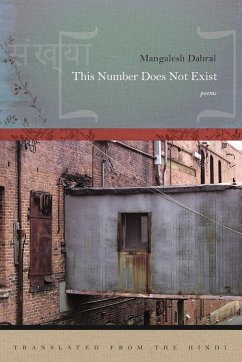An attentive critique on contemporary reality—modernity, capitalism, industrialization—this first United States publication of Mangalesh Dabral, presented in bilingual English and Hindi, speaks for the dislocated, disillusioned people of our time. Juxtaposing the rugged Himalayan backdrop of Dabral's youth with his later migration in search of earning a livelihood, this collection explores the tense relationship between country and city. Speaking in the language of deep irony, these compassionate poems also depict the reality of diaspora among ordinary people and the middle class, underlining the big disillusionment of post-Independence India.
"Song of the Dislocated"
With a heavy heart we left tore away from the ancestral home
mud slips behind us now stones fall in a hail
look back a bit brother how the doors shut themselves
behind each one of them a room utterly forlorn
Mangalesh Dabral was born in 1948 in the Tehri Garhwal district of the Himalayas. The author of nine books of poetry, essays, and other genres, his work has been translated and published in all major Indian languages and in Russian, German, Dutch, Spanish, French, Polish, and Bulgarian. He has spent his adult life as a literary editor for various newspapers published in Delhi and other north Indian cities, and has been featured at numerous international events and festivals, including the International Poetry Festival. The recipient of many literary awards, he has also translated into Hindi the works of Pablo Neruda, Bertolt Brecht, Ernesto Cardenal, Yannis Ritsos, Tadeusz Rozewicz, and Zbigniew Herbert. Dabral lives in Ghaziabad, India.
"Song of the Dislocated"
With a heavy heart we left tore away from the ancestral home
mud slips behind us now stones fall in a hail
look back a bit brother how the doors shut themselves
behind each one of them a room utterly forlorn
Mangalesh Dabral was born in 1948 in the Tehri Garhwal district of the Himalayas. The author of nine books of poetry, essays, and other genres, his work has been translated and published in all major Indian languages and in Russian, German, Dutch, Spanish, French, Polish, and Bulgarian. He has spent his adult life as a literary editor for various newspapers published in Delhi and other north Indian cities, and has been featured at numerous international events and festivals, including the International Poetry Festival. The recipient of many literary awards, he has also translated into Hindi the works of Pablo Neruda, Bertolt Brecht, Ernesto Cardenal, Yannis Ritsos, Tadeusz Rozewicz, and Zbigniew Herbert. Dabral lives in Ghaziabad, India.
Dieser Download kann aus rechtlichen Gründen nur mit Rechnungsadresse in A, D ausgeliefert werden.


